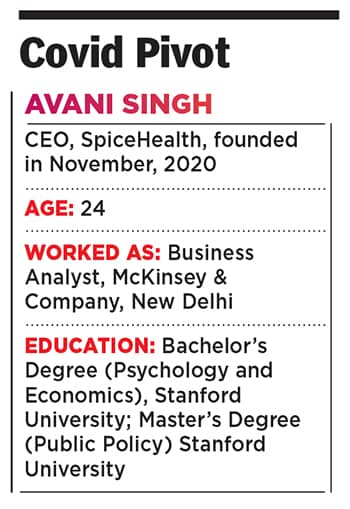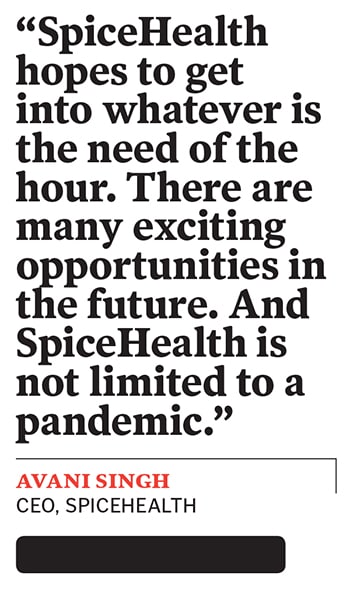How SpiceJet scion Avani Singh is championing the group's vaccine play
From drones to cold storage, the CEO of SpiceHealth has laid out some elaborate plans, apart from making testing cheaper


 Image: Madhu Kapparath
Image: Madhu Kapparath
In October this year, eight months into her job as an analyst with consultancy firm McKinsey in New Delhi, Avani Singh decided to call it quits.
The 24-year-old daughter of Ajay Singh, the chairman of India’s second-largest airline, SpiceJet, had begun working there shortly before Narendra Modi announced a nationwide lockdown in March. Of course, the lockdown hurt her family business, perhaps more severely than many others.
As airline movement came to a standstill, Ajay Singh had to quickly pivot his business to undertake more cargo operations in an attempt to keep the airline afloat. Since then, SpiceJet has begun to return to normalcy, with air travel seeing some recovery in the past few months and the Gurugram-headquartered company strengthening its position as one of India’s largest cargo operators.
“While I was working from home, it became jarringly obvious that the pandemic wasn"t going anywhere, anytime soon,” Avani told Forbes India. “Cases were rising, and I had the opportunity to meet a lot of government officials including the health minister of Delhi. Many of them had voiced their thoughts on how testing had reached a saturation point, and there just weren’t enough RTPCR tests to go around.”
Real-Time Polymerase Chain Reaction (RT-PCR) tests are considered the most effective in detecting the coronavirus in human cells. Delhi, meanwhile, is India’s sixth-worst city in terms of Covid-19 cases and has so far recorded over 600,000 cases, with over 10,000 people losing their lives. The national capital has seen sporadic spurts in cases since the outbreak began, with daily cases peaking at nearly 10,000 a day in November. Across India, Covid-19 cases are inching close to 10 million cases, with nearly 1.4 lakh deaths.
With testing becoming a constraint, Avani, a public policy graduate from Stanford University, decided to turn her attention to Covid-19 testing. She quit her job and in November, along with her father, set up SpiceHealth, an independent company, to make testing more accessible and affordable. Before that, SpiceJet had begun to facilitate testing through a partnership with visa service company VFS Global where passengers could submit their samples at a location of their choice, including at home, after which the airline would help facilitate the testing.
SpiceHealth can undertake RTPCR tests at Rs 499, a fraction of the Rs 4,500 that labs across the country were charging in the early days of the pandemic. The venture was inaugurated by the home minister, Amit Shah. The company has also tied up France-headquartered GeneStore, a diagnostics company, to set up portable testing facilities across the country.
“People in India should be able to afford the tests,” says Avani who set up mobile testing laboratories that have been deployed across some highly populated areas in Delhi including in Azadpur Mandi, one of the largest vegetable and fruit markets in Asia. The mobile laboratories are currently placed in a 40-foot container that can be towed on wheels, and the labs can return a test within six hours. “There just wasn"t any justification to the high costs,” Avani, who is the chief executive of SpiceHealth, says. "In Delhi the price for the test was around Rs 2,400 when we started. Now state governments have begun to bring it down."
The company is currently conducting tests in Delhi, in partnership with the Delhi government. “We have five labs right now. Each lab can process between 2,000 tests and 3,000 tests a day. Another five are being prepared. So, the focus is on scaling up.”
The company has also received approvals to conduct some 20,000 tests out of 50,000 daily tests in Delhi and is now firming up plans to set up facilities in Uttar Pradesh and Haryana. “Right now, the need of the hour is RT-PCR tests,” Avani says. “As we scale up, we"re hoping to optimise the container size to bring it down to 20 feet and then further down.”
Containers to vaccine delivery
The focus on RT-PCR tests and diagnostics, which Avani reckons has a significant role in the future, meanwhile is only the tip of the iceberg when it comes to SpiceHealth’s ambitions.
Over the next few months, Avani and her team have laid out some elaborate plans to help the Narendra Modi government in its quest to bring some reprieve from the pandemic.
“With the vaccinations coming in, we have already tied up with companies to ensure cold storage facilities,” says Avani. “I"m working along with SpiceXpress, which is our cargo division, to facilitate this.” Since the lockdown began, Ajay Singh and SpiceJet had turned much of their attention to cargo transportation, with the airline having ferried some 85,000 tonnes of cargo so far. “We flew from China to Coimbatore with just one PPE kit, to help Indian manufacturers make them locally,” Ajay Singh, the chairman of SpiceJet, had told Forbes India earlier. “We felt very good about that, and we did that at our own cost.”
SpiceJet’s cargo arm currently has a dedicated fleet of 17 cargo aircraft, which includes Boeing 737s, Bombardier Q400s, and a wide-body Airbus A340 plane. “We"re the largest cargo operator, and we have been looking at this segment because it"s almost unbelievable that a country of 1.3 billion people had just five freighter aircraft,” Singh had said in October.
In December, SpiceJet struck at least two deals with logistics companies to provide seamless end-to-end cold chain solutions for vaccine delivery in the country. First, the company tied up with New Delhi-headquartered Om Logistics where the logistics company will provide SpiceJet with refrigerated trucks to cover the first mile and the last mile across the length and breadth of the country. SpiceJet, meanwhile, will provide the necessary air support to carry the vaccines across India and internationally.
Similarly, the company also signed an MoU with Mumbai-based Snowman Logistics for jointly distributing the vaccines across India and internationally. Snowman will handle the ground services such as transportation from manufacturers, warehouses, airports and consumption points, packing, storage and warehousing, in the required temperature zones, while SpiceJet will provide the air connectivity for temperature-controlled distribution of the vaccines across India as well as internationally.
Besides, SpiceJet has also struck eight other partnerships including with Celcius Logistics Solutions to provide cold chain refrigerated vans and cold storage and re-conditioning and packaging services for the vaccine consignments. Then there is one with Crystal Logistics Cool Chain Limited to handle the acceptance and warehousing of Covid19 Vaccines, apart from six other partnerships involving logistics companies.
“Currently we have tied up with companies to ensure cold storage facilities to store between minus 40-degree Celsius and 25 degrees Celsius,” Avani says. “The cargo arm can help with transporting vaccines countrywide and beyond, and SpiceHealth, through mobile laboratories and last-mile connectivity, can ensure the access of the vaccines to remote areas of the country as well. So, I think that covers a large bit of transporting it to cities and across the country and the last-mile connectivity through SpiceHealth.”
The company also has an air ambulance division that it can deploy for transportation. Besides, in November, the company also launched Spice Pharma Pro under SpiceXpress, which can also be used to facilitate the transportation of the vaccine. The initiative provides real-time tracking with temperature and humidity sensors in addition to ensuring infrastructure to ensure minimum excursion of temperature. “We have been preparing for the humungous task of transporting medicines, vaccines, blood samples and temperature-sensitive cargo by developing end-to-end cold chain logistics solutions,” Ajay Singh had said while launching Spice Pharma Pro.
Drones to the rescue
Now, over the next few weeks, SpiceHealth is also doing a pilot run of its drone services to transport vaccines in the country. “We are conducting a trial with ICMR in the coming week or two to test out a drone service,” Avani says. “It is in the pilot stage. We also have the mobile laboratories which we will try to optimise to a smaller size to be able to reach the remoter parts of the country. So, it"s a combination of all these coming together and working to help deploy these vaccinations.”
India currently has about seven pharmaceutical companies looking to develop or manufacture a vaccine for large-scale deployment, as soon as they receive approvals. Out of these, the candidates of four ventures have reached late-stage trials. Most Covid-19 vaccines, including the ones being rolled out by Bharat Biotech and Serum Institute of India, are to be stored at temperatures between 2 and 8 degrees Celsius, while some others like the ones being developed by Moderna and Pfizer need to be stored at sub-zero temperatures of -20 degree and -70 degrees Celsius respectively.
While there is still no clarity on how the Indian government plans to distribute the vaccine, the country’s health secretary Rajesh Bhushan said on December 15 that 29,000 cold-chain points, 240 walk-in coolers, 70 walk-in freezers, 45,000 ice-lined refrigerators, 41,000 deep freezers and 300 solar refrigerators were to be used for vaccination purposes across the country.
“There is a huge opportunity for the private sector and companies like SpiceJet,” Barnik Chitran Maitra, managing partner, India and South Asia, of consultancy firm Arthur D. Little. “As per the current capacity, if we want to administer the vaccine in about four months, the capacity is short by 60 percent. But over a nine-month period, we might have enough capacity. So, there are capacity bottlenecks. The private sector has opportunities, especially in refrigerated trucks or storage. In that sense, it is a smart play by SpiceJet and definitely makes sense to focus in this area.”
A November 2020 report from Credit Suisse says that India will need about 1.7 billion Covid-19 vaccine doses to vaccinate the majority of its adult population. “It targets to administer 400-500 million doses by July-2021,” the report says. “In our view, there is sufficient capacity for vaccine manufacturing (>2.4 billion doses) and various components like vials, stoppers, syringes, gauze, alcohol swabs, etc.”
With India’s current facilities, Credit Suisse reckons that the country will be able to administer only between 550 million and 600 million doses of vaccine annually. “The bottleneck in India’s Covid-19 play will be cold storage infrastructure (especially refrigerated vans) and by using a part of the capacity of the current immunisation programme (600 million doses) and the cold chain infrastructure of the private sector (250-300mn doses), potential vaccinations can reach 550-600 million doses annually,” the Credit Suisse report says. That will also require manpower of around 100,000.
On December 11, SpiceJet tied up with MyLogistics for cold chain vaccine handling and is now training more than 500 employees of SpiceJet"s cargo arm SpiceXpress on cold chain vaccine handling. “The last mile execution, training and mobilisation becomes extremely crucial going forward, and the more capacity we can create, the better it is for the country,” adds Maitra. “What becomes important is also how the private sector can strike deals with state governments, who will play a crucial role in the rollout.”
SpiceHealth and Avani Singh, meanwhile, are only getting started. “SpiceHealth hopes to get into whatever is the need of the hour,” Avani, who got her private pilot licence last year, says. “There are many exciting opportunities in the future. And SpiceHealth is not limited to a pandemic which means apart from diagnostics, areas such as genome sequencing provide opportunities.”
First Published: Dec 18, 2020, 16:59
Subscribe Now
